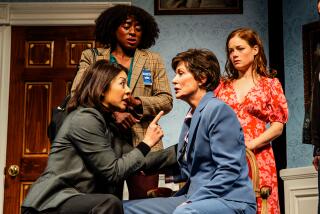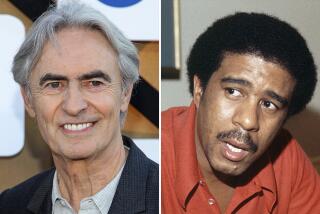When feminist debate turns into an ideological free-for-all: It’s the Wooster Group’s ‘Town Hall Affair’
The Wooster Group, venerable purveyor of postmodern performance collages, has come upon a gender-politics gold mine in the company’s latest adventure in cockeyed cultural excavation.
“The Town Hall Affair,” which opened Wednesday at REDCAT, re-creates a raucous night in the annals of second-wave feminism. The year is 1971, and the occasion is a debate at New York’s Town Hall with a misleadingly sedate title: “A Dialogue on Women’s Liberation.”
The historic panel was indeed a mouthwatering cultural event. The illustrious panelists included Germaine Greer, the glamorously contentious author of “The Female Eunuch”; renegade Village Voice scribe Jill Johnston, whose prose style veers in the direction of lesbian spoken-word; and Diana Trilling, distinguished critic, defender of the marital orgasm and card-carrying member of the literary establishment.
The moderator was Norman Mailer, fresh off the controversy of his anti-feminist polemic “The Prisoner of Sex.” An immoderate choice, Mailer was clearly recruited to keep the evening feisty.
He succeeded. The debate, traditionally set up on stage, made a vain attempt at preserving a dignified academic air. But the proceedings quickly degenerated into a mud-wrestling match of irreconcilable worldviews.
Elizabeth LeCompte’s compact production (lasting just over an hour) takes its cues from the 1979 film “Town Bloody Hall” by Chris Hegedus and D.A. Pennebaker. Shown on a screen placed behind the debate table, the documentary preserves with jittery camera work the clash of self-dramatizing personalities that was hyped as a titanic battle of the sexes.
LeCompte’s actors perform their famous roles in a stylized fashion that can uncannily hit the realistic mark. There’s a karaoke element to the performances, but of a deliciously experimental kind that accentuates the rhetorical rhythms and idiosyncrasies of the various speakers.
“The Town Hall Affair” samples not just ideas but the minds they spring from. As Greer, Maura Tierney (of Showtime’s “The Affair”) tastily combines rowdy Australian seductiveness with formidable Oxbridge common sense. This wisp of steel owns her vulnerability so that male bullies can’t exploit it. Not even the notoriously pugnacious Mailer can land a decent blow.
Greg Mehrten, kitted out in matronly drag, draws out of his portrait of Trilling the pompous cadences of a New York intellectual who balances haughty convention with revolutionary fervor. (The gender-bending casting isn’t played for laughs, but a droll irreverence guides this Wooster Group séance.)
Kate Valk, still the Wooster Group’s most potent weapon, steals the show with her hippy-dippy portrayal of Johnston. A birdlike drone lacking GPS, Valk’s Johnston delivers a free-associative monologue so rambling that Mailer transforms into a wisecracking circus ringleader to get her to stop talking.
Scott Shepherd and Ari Fliakos take turns incarnating the brash, bumptious Mailer, whose offensive remarks rile the panelists and audience member to the point of near riot. (Imagine Archie Bunker as literary showman and you’ll have some idea of his antagonistic effect.)
The collision of disparate genres being standard artistic practice for the Wooster Group, another film is spliced into the production to provide counterpoint. Excerpts of Mailer’s 1970 film “Maidstone” (for which Pennebaker served as a cinematographer) are re-created in small, obscure segments that don’t communicate much in the way of story but reveal the ingrained aggressiveness of a domineering male artist.
Rife with violence, subjugation, fear and discontent, the flashing scenes from “Maidstone” add a menacing dimension to the issues hotly contested in the Town Hall brouhaha. Mailer, in his presence and in his artistic output here, proudly epitomizes here the weight of male patriarchy.
These “lady” writers and critics, as they are patronizingly called, still manage to best their arrogant moderator even though they spend a good deal of time fighting with one another. But “The Town Hall Affair” doesn’t want us to pick a single winner.
By presenting the arguments as a shifting kaleidoscope, the Wooster Group keeps us from identifying with one point of view. The historical lens that’s playfully imposed throws into relief the unresolved nature of these still boisterous conflicts.
♦ ♦ ♦ ♦ ♦ ♦ ♦ ♦ ♦ ♦
The Wooster Group: ‘The Town Hall Affair’
Where: REDCAT, 631 W. 2nd St., L.A.
When: 8:30 p.m. Friday and Saturday, 3 p.m. Sunday, 8:30 p.m. Tuesday-April 1
Tickets: $55
Information: (213) 237-2800 or www.redcat.org
Running time: 1 hour, 5 minutes
SIGN UP for the free Essential Arts & Culture newsletter »
Follow me @charlesmcnulty
More to Read
The biggest entertainment stories
Get our big stories about Hollywood, film, television, music, arts, culture and more right in your inbox as soon as they publish.
You may occasionally receive promotional content from the Los Angeles Times.











